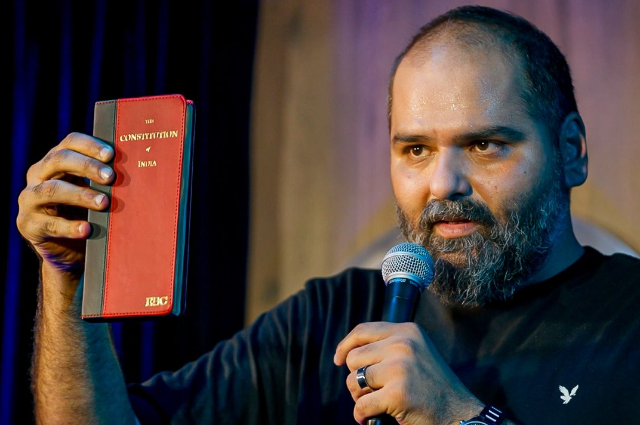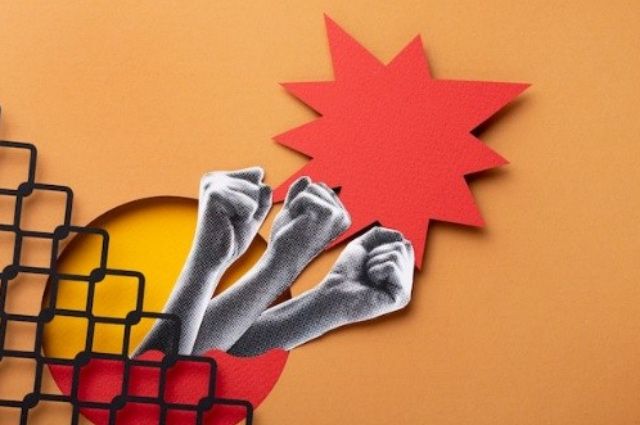Comedy in India has long been a challenging space, but recent incidents have made it even more perilous. The controversy surrounding comedian Kunal Kamra has amplified concerns about the risks associated with satirical performances. After Kamra made a satirical remark directed at Maharashtra Deputy Chief Minister Eknath Shinde, members of the Shiv Sena vandalized Mumbai’s Habitat Comedy Club, leading to its forced closure. Additionally, the Mumbai Police summoned Kamra, further fueling the debate on artistic freedom. As a result, many comedians now fear not only censorship but also for their personal safety. With public outrage growing and venues shutting down, the future of stand-up comedy in India appears increasingly uncertain. Hyderabad-based comedians have shared their perspectives on the issue by shedding light on the various challenges they face in the industry.
They believed that Kunal made fun of their boss, so they wanted to make fun of Kunal. To roast him so bad, that it'll turn into a roast battle. Well, no, they can't do this. Because comedy requires a sense of humour. It requires creativity and talent. Comedy requires a spark and a healthy amount of IQ.
The Pressure of Censorship and Fear of Retaliation
Muneer Taufeeq: "Censorship and Vandalism Are Not the Answer"
Muneer Taufeeq, a comedian who began his journey four years ago, recalls how political scrutiny of comedy existed even then, albeit at a lower level. However, since 2014, this scrutiny has intensified. When writing jokes, he now unconsciously steers clear of controversial topics to avoid trouble, especially when planning to record his performances for platforms like YouTube.
Comedy clubs have also started reviewing performances in advance to ensure they do not contain content that could invite backlash. The fear of vandalism discourages venues, such as auditoriums from hosting stand-up shows. The Kunal Kamra incident is a stark reminder of how severe the situation has become. Taufeeq believes that while public outrage is understandable, censorship and acts of violence should never be the means to address dissenting opinions. He emphasizes that comedy should remain unrestricted unless it becomes a personal attack against an individual.
The Stifling of Artistic Creativity
Sravanthi Basa: "This Isn’t Progress; It’s Regression"
The unpredictability of the comedy scene in India is a growing concern for many artists. Sravanthi Basa, a comedian known for dark humour, once felt relatively safe by avoiding sensitive topics such as politics and popular public figures. However, after witnessing the controversy surrounding the show India’s Got Latent, she is no longer confident that any comedian is truly safe from scrutiny.
The shift in the digital age, where content engagement dictates what is acceptable, has resulted in a disturbing trend of silencing artists. Forcing a comedian to either speak or remain silent on particular issues is an infringement on creative freedom. Comedy is meant to add humour to life’s realities even the harsh ones, and in doing so, it can unite people through laughter.
The closure of comedy venues and the intimidation of comedians are deeply concerning. Such actions do not contribute to progress; rather, they reflect a regression in freedom of expression. Basa argues that responding to comedy with violence is unjust and inhumane. If someone disagrees with a comedian’s perspective, the best countermeasure is to engage in comedy themselves—not resort to threats and attacks. Today, being a comedian in India is not just about preserving artistic integrity; it is about personal survival in an increasingly hostile environment.
Freedom of Speech Under Threat
Anirudh Maviloth: "Dialogue Is Always More Effective Than Outrage"
The attack on the comedy club and the subsequent backlash against Kunal Kamra highlight a worrying decline in freedom of speech in India. Kamra attempted to make a statement about his right to express his opinions by holding up a copy of the Constitution. However, those who vandalized the venue neither understood the joke nor the message behind it.
Comedians have become easy targets, facing threats from political factions and devoted fans of public figures. Stand-up comedy is often an introverted profession, making comedians particularly vulnerable. Many artists constantly worry about potential repercussions, regardless of whether their content is political or lighthearted.
Comedy serves as a medium to discuss societal issues through humour. However, in India, when people lack an appropriate counterargument, they often resort to violence instead. The fact that those responsible for acts of vandalism are often released on bail within a day highlights the flawed system in place. It seems that getting arrested for violence is easier to escape than the backlash from a controversial joke.
The Growing Culture of Offense
Ashok Khatri: "It’s in Our DNA to Get Offended"
The severity of the recent backlash took many by surprise. Kunal Kamra has been vocal about political issues for some time, yet this is the first instance of such extreme measures being taken against him. Khatri firmly believes that resorting to violence in response to differing opinions is unacceptable.
Comedy is subjective—what one person finds amusing, another might find offensive. However, placing restrictions on comedy defeats its purpose, as it is an art form centred on expressing personal thoughts and experiences. The current climate suggests that comedians can no longer discuss struggles or issues affecting cities, as even those topics are deemed inappropriate.
The consequences of such restrictions are severe. One of India’s leading comedy clubs has shut down, adding to the existing shortage of high-quality performance venues. Running a comedy club is already a financially risky endeavour, and the added fear of retaliation only makes it less appealing. As a result, the comedy industry in India is facing setbacks that may hinder its growth for years to come.
The Future of Comedy in India
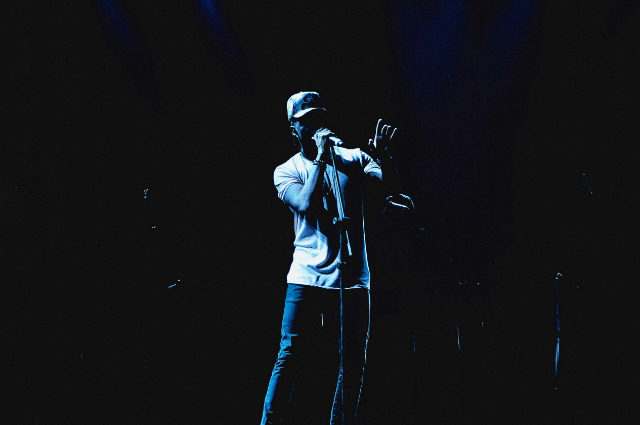
Photo by Vinicius "amnx" Amano on Unsplash
The recent controversies surrounding stand-up comedians in India reveal a troubling trend of shrinking space for artistic expression. Comedy is meant to challenge perspectives, spark conversations and provide entertainment. However, increasing censorship, threats and acts of violence are making it an unsafe profession. If this trend continues, India risks losing an essential medium of social commentary and creative expression.
For a thriving democracy, freedom of speech must be protected and comedy should be allowed to flourish without fear. The best response to a joke is either to laugh or counter it with another joke—not to silence comedians through intimidation. The future of stand-up in India depends on fostering an environment where artists can express themselves freely without the constant fear of oppression.
The State of Free Speech: A Crisis in Democracy
The recent controversy surrounding comedian Kunal Kamra's skit has reignited the debate on freedom of expression in India. If the respected Chief Minister and his supporters believe Kamra's act was a breach of freedom of expression, legal avenues such as filing a court case or even a defamation suit are available. However, instead of following due process, they have resorted to hooliganism by drawing widespread criticism not only within the country but also internationally. This raises a fundamental question: will the law be fair and just in this case? Will those who caused chaos at the venue face legal consequences? Reports indicate that many of the perpetrators, including Shiv Sena leaders and workers have already been granted bail.
While the court granted them bail after their arrest, this incident exposes an obvious flaw in our judicial and political system. In a country where minor allegations lead to bulldozer justice, comedians face death threats for their work, and individuals accused of severe crimes receive mere symbolic punishments, it seems that the rule of law is increasingly being mocked. Ironically, while corruption is easily forgiven through political arrangements and donations, acts of satire and criticism are met with severe backlash.
The Increasing Normalization of Hooliganism
Vigilantism and political thuggery have become a norm in our country. Take the case of comedian Nalin Yadav, who faced violent attacks simply for being associated with the arrested comedian Munawar Faruqui. He awoke one morning to find a burning motorcycle tyre on his rooftop. Upon reaching out to his neighbours for help, he and his brother were physically assaulted. When he contacted the police helpline, he was told to visit the police station. When he went to the police station, he was advised to call the helpline. This cycle of administrative negligence left him vulnerable, forcing him to go live on Instagram to ensure his safety. His troubles didn’t end there—he has been repeatedly attacked over the years, with the police doing little to protect him. Instead, he faced countercharges including a notice for inciting violence, all while his comedy career was systematically destroyed.
A Pattern of Political Repression
The silencing of comedians is not an isolated event. Comedian Pranit More was attacked by a mob for a joke about Bollywood actor Veer Pahariya. Comedian Agrima Joshua faced rape threats after satirizing misinformation about a Shivaji statue, and instead of holding her attackers accountable, she was the one who had to issue an apology. Comedian Mohit Morani, too, found himself at the centre of controversy for merely highlighting societal biases, facing death threats and mob intimidation.
The larger concern here is that political violence and hooliganism are not limited to any one party. Mamata Banerjee’s government once arrested a professor for sharing a cartoon about her. Uddhav Thackeray’s administration witnessed the brutal assault of a retired Navy officer for forwarding a caricature. Congress leaders have also suppressed political satire in their strongholds. The suppression of dissent is a bipartisan issue, revealing a broader authoritarian mindset among the political class.
The Role of Law Enforcement and Judiciary
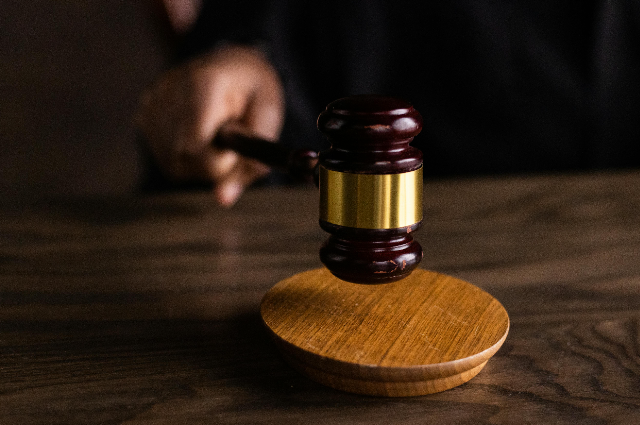
While mob violence against comedians and satirists continues, law enforcement often plays the role of silent spectators or, worse, enablers. Instances such as the police cancelling Anubhav Singh Bassi’s show in Uttar Pradesh due to vague 'security concerns' illustrate how institutions meant to uphold the law instead succumb to mob pressure. Even in cases with clear evidence of criminal behaviour, such as the attack on The Habitat venue, perpetrators walk free while the police protect them instead of the victims.
Historically, India has upheld a tradition of political satire. Cartoonist Keshav Shankar Pillai routinely mocked Prime Minister Nehru, who encouraged him to continue without restraint. Similarly, Manmohan Singh and Sonia Gandhi were openly ridiculed on television during their tenure, without any legal or extralegal repercussions. However, today’s politicians see themselves as rulers rather than public servants, refusing to tolerate any criticism.
The Need to Normalize Political Satire
In a truly democratic society, the people should have the right to criticize, mock, and satirize their leaders. Political figures are public representatives, not monarchs. Democracy thrives on scrutiny, and humour has long been a tool to hold power accountable. Instead of encouraging blind devotion, citizens should learn to tolerate jokes—even those aimed at their favoured leaders. The solution to countering political hooliganism is to normalize satire through memes, cartoons, and satire songs. This is not just about protecting comedians—it is about preserving the democratic ethos of our nation.
India must not become a place where fear stifles free speech. The time has come for citizens to reclaim their right to joke, to critique, and to speak without fear of retribution. The strength of democracy lies not in the suppression of dissent but in its ability to embrace it.
Jai Hind! Long live democracy, long live our Constitution!
The Illusion of Awareness: How Distractions Keep Us Silent
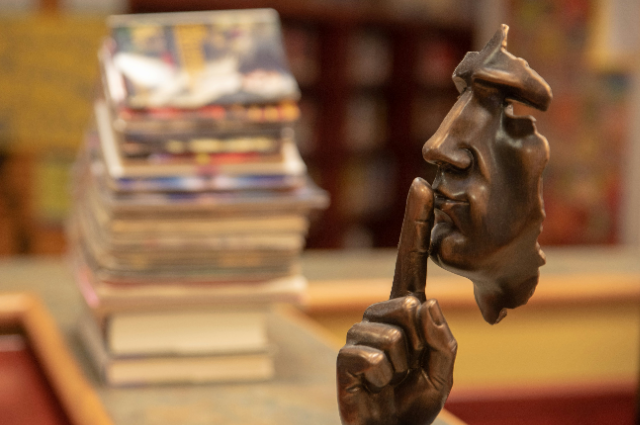
Photo by Ernie A. Stephens on Unsplash
It’s easy to say that the public is not foolish and that people understand everything. But awareness doesn’t arise on its own—it must be cultivated. If crucial information is systematically hidden, manipulated, or replaced with trivial distractions, how will awareness ever grow?
The truth is, that the public is constantly occupied. Cricket, Bollywood controversies, sensational celebrity gossip, and communal narratives dominate the news cycle. One day, the media is consumed with Kangana vs. the world; the next, it’s dissecting Virat and Anushka’s personal life. Some days, the headlines are about a celebrity's fashion choices, and on others, they discuss historical figures like Aurangzeb or glorify past rulers. The narrative keeps shifting where there is more popularity, those are some topics which even the media would like to telecast.
Meanwhile, critical issues—unemployment, economic disparity, corruption, national security, China’s geopolitical moves, terrorism, women's safety, and even something as basic as potholes—are conveniently left out of mainstream discussions. No outrage. No accountability. No pressure on those in power.
The latest controversy involving comedians Samay Raina and Kunal Kamra is just another example. It will dominate conversations for a while—until the next convenient issue emerges. In the meantime, real problems will continue to pile up, unnoticed, unchallenged. Now, what’s the result? Politicians stay happy, the public stays distracted, and the illusion that "everything is fine" persists. This cycle will not break unless people start questioning, challenging, and demanding answers. Silence only benefits those in power. It’s time to reclaim the real narrative.
. . .
References:

